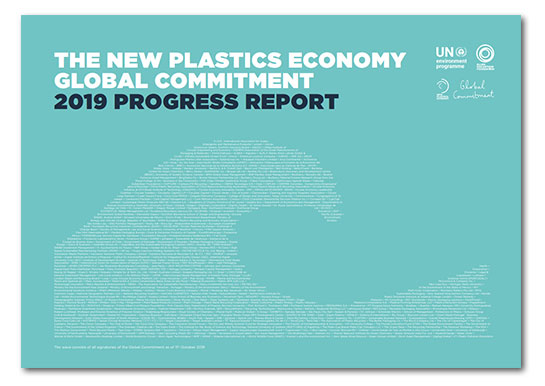Companies set out actions to eliminate problematic plastic packaging, and increase the use of recycled plastic in packaging by more than five-fold by 2025
A new report published by the Ellen MacArthur Foundation, in collaboration with the UN Environment Programme, reveals the scale of global efforts to prevent plastic pollution. The report comes 12 months after the launch of the New Plastics Economy Global Commitment, which set out a circular economy vision for plastic.
Launched in October 2018, the Global Commitment now has over 400 organisations committed to eliminating problematic and unnecessary plastic packaging, and innovating so that all plastic packaging is 100% reusable, recyclable, or compostable, and can be safely and easily circulated without becoming waste or pollution.
Ecosurety joined the commitment in March this year, in recognition of the proactive positive impact made towards improving UK plastics recycling through innovation and education. This includes projects such as #LeedsByExample, #InTheLoop and PolyMet.
Promising early results
This new report provides an unprecedented level of transparency on how almost 200 businesses and governments are changing their plastic production and use to achieve this. It shows promising early progress.
Unilever has announced it will reduce its use of virgin plastic in packaging by 50% and Mars, Incorporated said it will make virgin plastic reductions of 25% by 2025. PepsiCo aims to reduce the use of virgin plastic in its beverage business by 20% by 2025. These are absolute terms reductions against today’s volumes.
Some of the most commonly identified problematic plastic items and materials are being eliminated at scale. For example, around 70% of relevant business signatories are eliminating single-use straws, carrier bags and carbon black plastics, and around 80% are eliminating PVC from their packaging.
Government signatories such as France, Rwanda, the UK, and the cities of São Paulo (Brazil) and Austin (USA), to name a few, are among those putting in place a diverse set of policy measures that go beyond bans, and include public procurement and extended producer responsibility (EPR) schemes, awareness campaigns, fiscal measures, and incentives for research and development.
Analysis carried out for the report shows that on average around 60% of business signatories’ plastic packaging is reusable, recyclable or compostable today. Through the Global Commitment they have committed to make this 100% by 2025. Packaged goods and retail signatories have pledged to increase recycled plastic in their packaging more than five-fold, from 4% to 22%, by 2025. The signatories’ total demand for recycled content in packaging by 2025 will be more than 5 million tonnes annually, equivalent to keeping 25 million barrels of oil in the ground every year.
Significant investments
Significant investments are being made to achieve these targets. Leading plastics producer Indorama Ventures has pledged to invest $1.5 billion towards achieving its target of producing at least 750,000 tonnes of recycled PET per annum by 2025. The UK Government is mobilising approximately £3 billion towards improving local collection and recycling infrastructure and packaging innovation through public-private finance initiatives. In addition, recycling companies that have signed the Global Commitment have committed to collectively quadruple the amount of recycled plastics they produce by 2025.
Sander Defruyt, New Plastics Economy lead at the Ellen MacArthur Foundation, said “Around the world people are calling for businesses and governments to take action to stop plastic pollution. Leading businesses and governments stepped forward by signing the Global Commitment and we can now see promising early progress."
"This includes major commitments to reduce the use of virgin plastic, the introduction of reuse pilot projects, and unprecedented demand for recycled plastic in packaging. But there is a long way to go and it is crucial those efforts are accelerated and scaled, and more businesses and governments take action to eliminate plastic pollution at the source.”
Click the image above to read the full Plastics Economy Global Commitment report
To find out more about how Ecosurety helps producers to track their progress towards plastics reduction targets, please contact us.

Ben Luger
Marketing projects specialist
Ben joined the team at the beginning of 2015 and helps drive marketing communications and projects for Ecosurety, including project managing the launch of the Ecosurety Exploration Fund and website content development.

Latest News

Q2 2024 recycling data shows strong performance in H1
By Sam Marshall 24 Jul 2024
Ecosurety continue to step up for refill and reuse
By Victoria Baker 24 Jun 2024
Ecosurety renews B Corp™ certification with flying colours
By Louise Shellard 11 Jun 2024
Ecosurety sponsor the 2024 Carbon Literate Organisation Awards
By Louise Shellard 07 Jun 2024

